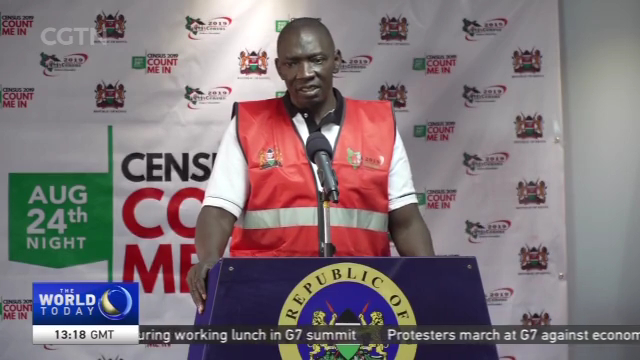
22:11, 25-Aug-2019
Kenya's National Census: Digital devices used to record population data
Updated
22:24, 25-Aug-2019

Kenya's latest national census began on Saturday. Workers are crisscrossing the country to capture details about the country's growing population. For the first time, they're using electronic devices to record and relay the data collected during the survey, which is carried out once every decade. This information will be used by the government to help make future policy decisions. CGTN's Wilkister Nyabwa has more.
Sunset heralded the beginning of Kenya's sixth national census exercise. With most pubs and other entertainment closed, Kenyans headed home to wait for the enumerators - individuals recruited by the government to carry out the seven-day counting exercise. A population census is the process of counting the people in a country at a specific time. Across the country, the over 130,000 enumerators visited homesteads at night, when most people were believed to be at home. They set out in groups, for security and efficiency.
CYRUS OGUNA GOVERNMENT SPOKESPERSON "The Ministry of Interior has collaborated with other agencies, county commissioners, regional commissioners, chiefs, sub-chiefs and village elders so that there's no destabilization of any kind during this exercise and indeed there are additional police officers that have been deployed to ensure this exercise goes smoothly."
It wasn't the first time Peter Serem was participating in the census. But this time things were different. Instead of the old bulky forms, enumerators carried electronic tablets containing a raft of questions for each member of his household.
PETER SEREM NAIROBI RESIDENT "The last census, the questions were similar to these ones, but I can say these ones are more, they are more than, it is everything in one. You can see how it can help the government how to, how to plan."
The key questions asked include data about age, sex, marital status, births, deaths, migration and economic activities. This year for the first time the country will also count two special groups --persons with albinism as well as intersex individuals included as the third gender in the survey.
CATHERINE MUKAMI NAIROBI RESIDENT "So we expect we'll get the exact numbers like even the total population, the ethnic groups and all that, and even the outcome, what do they really want to achieve apart from knowing our numbers and the population? At least something like economic balance, we need to know how many are employed, how many are unemployed and how can they bring those numbers together and average them. And exactly what will they do, perhaps, for the poor people?"
CYRUS OGUNA GOVERNMENT SPOKESPERSON "This census data is not for today. It's for posterity. It's data that the government will be able to use to be able to plan for those yet to be born, for the next ten years."
The census will continue for a week with preliminary results expected three months after the exercise ends, and a final report after a year. It is expected to shed light on the changing face of Kenya, while highlighting emerging trends and vital issues to be addressed by the government.
WILKISTER NYABWA NAIROBI "The data which the government will collect during the census exercise will provide a valuable well of information about the country's population. This information will then be useful in resource allocation as well as in formulating development plans. Wilkister Nyabwa, CGTN, Nairobi, Kenya."
SITEMAP
Copyright © 2018 CGTN. Beijing ICP prepared NO.16065310-3
Copyright © 2018 CGTN. Beijing ICP prepared NO.16065310-3